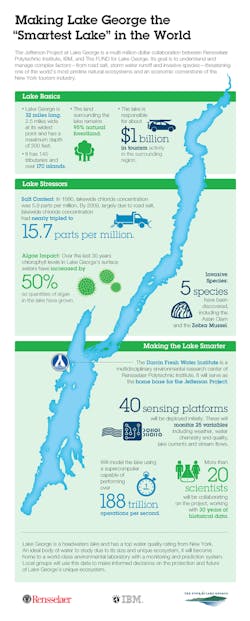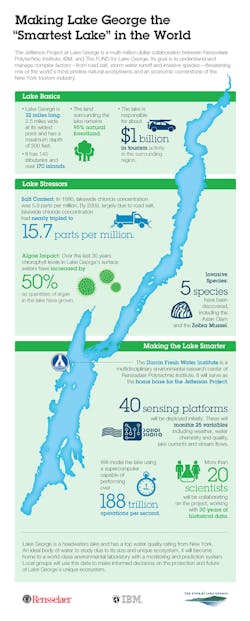Note: See infographic below article for more information
BOLTON LANDING, NY, June 27, 2013 -- A three-year, multi-million dollar partnership called "The Jefferson Project at Lake George" has been established to understand and manage threats -- from road salt to weather to invasive species -- facing New York's Lake George, one of the world's most pristine natural ecosystems and an economic cornerstone of the state's tourism industry.
The partners include the Rensselaer Polytechnic Institute, IBM, and The FUND. They expect this world-class scientific and technology facility at Lake George will create a new model for predictive preservation and remediation of critical natural systems on Lake George, in New York, and ultimately around the world.
The Jefferson Project, an homage to President Thomas Jefferson's declaration of Lake George as "without comparison, the most beautiful water I ever saw," will establish the world’s most sophisticated lake environmental monitoring and prediction system giving scientists and the community a real-time picture of the health of the lake. Lake George is a headwaters lake, meaning it has limited external influences on water quality which has led to its "Class AA-Special" water quality rating from New York. Lake George is an ideal body of water to study due to its size and unique ecosystem. Approximately 95 percent of the land surrounding Lake George remains as natural forestland, 46 percent of which is "forever wild" state-owned forest preserve.
With financial support from the FUND for Lake George, scientists from Rensselaer have been studying the Lake for 30 years and have noted the emergence of environmental stressors that include rising levels of chlorophyll that threatens water clarity and a three-fold increase in salt levels due primarily to road salt applied to roads in the watershed. Lake George tourism alone accounts for an estimated $450 million of economic activity in Warren County and approximately $1 billion in the surrounding region. The long term health of the Lake is critical to the region and New York State’s tourism industry.
The partners will use a combination of advanced data analytics, computing and data visualization techniques, new scientific and experimental methods, 3-dimentional computer modeling and simulation, and historical data to gain an unprecedented scientific understanding of Lake George. Also, central to the project will be sensors and weather modeling technology used around the world by IBM, including Rio de Janeiro, Galway Bay, Ireland and New York's Hudson River. This will be the first time all these technologies will be put together anywhere in the world. The combination of these unique predictive capabilities will enable scientists and the community to prioritize and act before permanent degradation can take place.
For example, the new monitoring system will give scientists a view for the first time of circulation models in Lake George. These 3-D models will then be used to understand how currents distribute nutrients and containments across the 32-mile lake and their correlation to specific stressors. These models will then be overlaid with historical and real-time weather data to see the impact of weather and tributary flooding on circulation patterns in Lake George.
IBM will provide a Blue Gene/Q supercomputer and other hardware, software, and support to create a new, Smarter Water laboratory and visualization studio at Rensselaer’s Margaret A. and David M. Darrin '40 Fresh Water Institute on Lake George. A team of IBM researchers, in partnership Rensselaer and the FUND for Lake George, will pair their expertise with this new technology to help local leaders see a real-time picture of the current and future computer modeled conditions, water chemistry, and health of the natural systems. Local groups can use this data to make informed decisions on the protection of Lake George’s pristine waters and unique ecosystem.
"Through the Jefferson Project, Rensselaer, the Fund for Lake George, and IBM will advance the state of the science and the practice of water management to create a more precise, actionable and sustainable model that will give us a path forward." said John E. Kelly III, senior vice president and director of IBM Research.
"The still pure water of Lake George is the lifeblood of our economy, but it will take unprecedented commitment to keep it that way," said Jeffrey M. Killeen, Board Chairman of the FUND for Lake George. "By shining the light of science on the future of Lake George, this bold partnership will empower our ability to succeed. It is an historic opportunity to demonstrate just what it will take to protect a priceless natural treasure for future generations. The FUND for Lake George is honored to be playing a role in this vital pursuit."
Lake George, about 150 km north of Albany in upstate New York, is known internationally for its crystal clear waters with a depth of up to 200 feet. Rich in natural and cultural history, it is 32 miles long and up to three miles wide, formed nearly 10,000 years ago by melting glaciers.
The Darrin Fresh Water Institute, with the support of the Fund for Lake George has documented the changes in Lake George's ecosystem for more than 30 years. Pairing this comprehensive scientific database of lake conditions with new sensor acquired data, advanced analytics, computing, and data visualization technologies, Jefferson Project researchers will be able to investigate and address key questions including:
· What was the pristine state of the lake?
· What is the impact of salt and chlorophyll overloading on the lake?
· Where and when do invasive species enter and spread through the lake?
· What remediation strategies may be effective?
At Rensselaer, this project partners the pioneering experimental methods of student and faculty researchers at the Darrin '40 Fresh Water Institute with the leading-edge data and analytics research conducted by students and faculty within the university’s Tetherless World Constellation.
For more information visit www.thejeffersonproject.com
About The Fund for Lake George
The FUND for Lake George is a privately funded not-for-profit organization dedicated to the protection of Lake George. Formed in 1980, the FUND applies a science-based approach to protection focused on Lake George water quality and the overall health of the Lake George watershed. The FUND pursues this mission through support of long-term scientific research, direct advocacy, and strategic partnerships with diverse public and private interests. The FUND recently adopted its “Legacy Strategy” that focuses on environmental and economic imperatives as now required to protect Lake George for the next generation. The FUND sponsors the Lake George Waterkeeper among other programs on Lake George. The FUND for Lake George is managed by a Board of Trustees and maintains an office in Lake George. For more on the FUND’s work, see www.fundforlakegeorge.org.
About IBM Smarter Planet
With advances in technology — sophisticated sensor networks, smart meters, deep computing and Big Data analytics — IBM is helping clients and cities make smarter decisions about water management. By monitoring, measuring and analyzing water systems, from rivers and reservoirs to pumps and pipes, we can better understand the issues around water. IBM is applying its expertise in smart systems and data analysis to help companies, governments and citizens understand and more effectively deal with these issues. For more information, please visit www.ibm.com/smarterplanet/water.
About Rensselaer
Rensselaer Polytechnic Institute, founded in 1824, is the nation’s oldest technological research university. The university offers bachelor’s, master’s, and doctoral degrees in engineering, the sciences, information technology, architecture, management, and the humanities and social sciences. Institute programs serve undergraduates, graduate students, and working professionals around the world. Rensselaer faculty are known for pre-eminence in research conducted in a wide range of fields, with particular emphasis in biotechnology, nanotechnology, computation and information technology, the media arts and technology, and energy and the environment. The Institute is well known for its success in the transfer of technology from the laboratory to the marketplace so that new discoveries and inventions benefit human life, protect the environment, and strengthen economic development.
# # #




